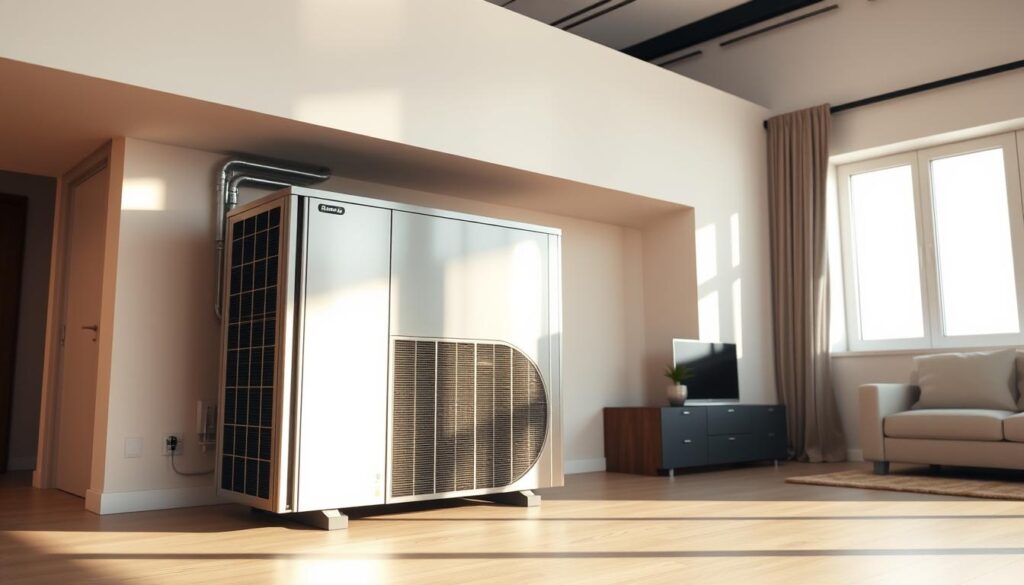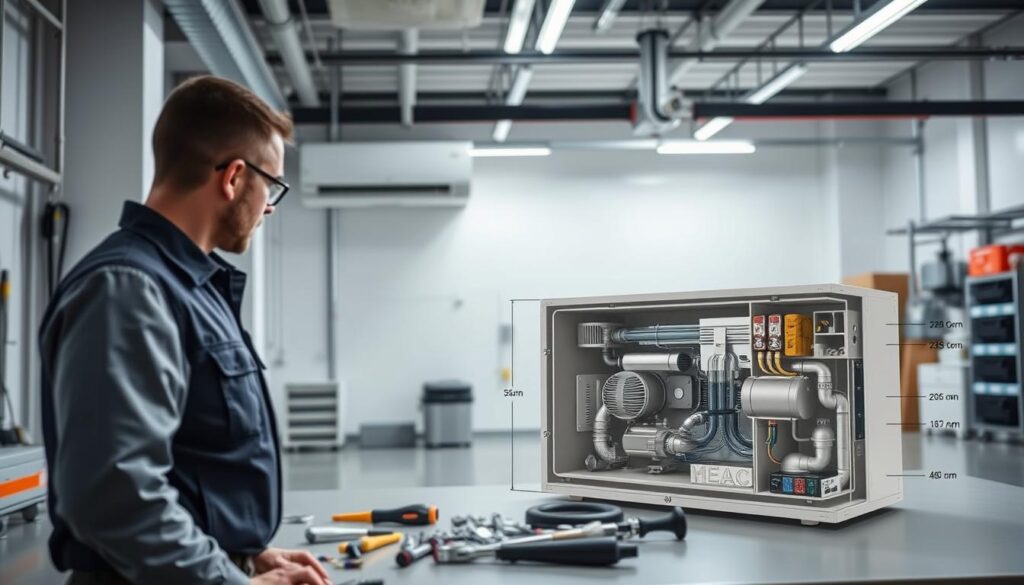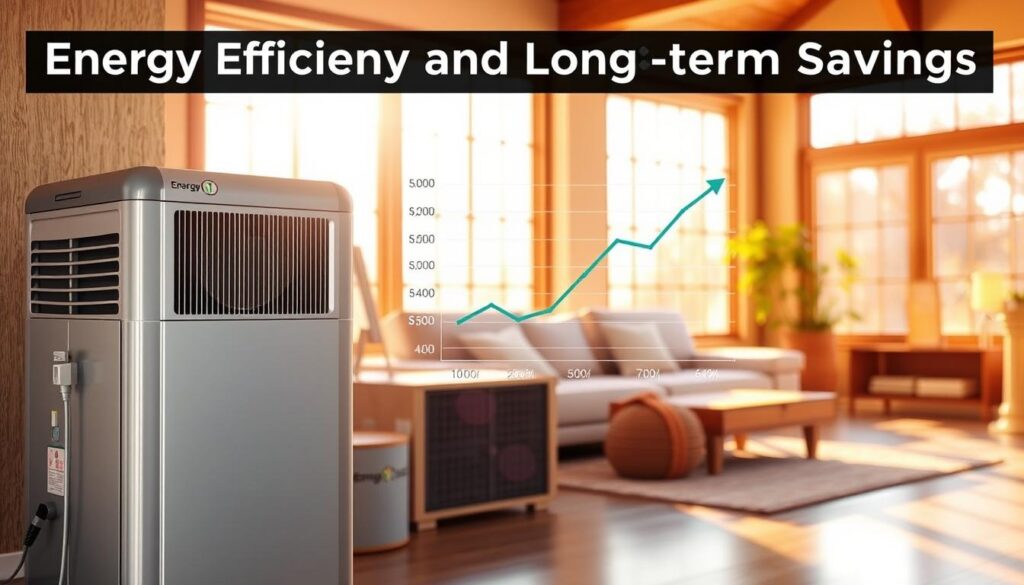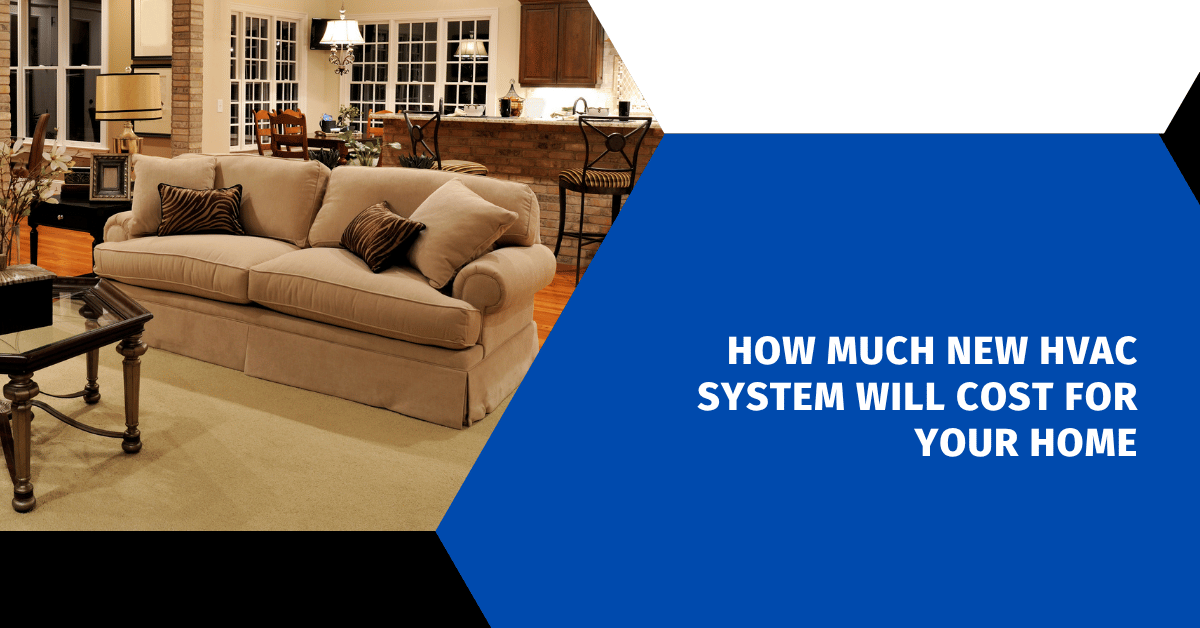Affiliate Disclosure
HVAC Guide Guys is a participant in the Amazon Services LLC Associates Program, an affiliate advertising program designed to provide a means for sites to earn advertising fees by advertising and linking to Amazon.
How Much New HVAC System Will Cost For Your Home? Are you curious about the cost of a new HVAC system? Knowing the true cost can save you thousands of dollars in unexpected expenses.

Homeowners in the United States spend between $5,000 and $12,500 on new HVAC systems. The average cost is around $7,500. But, the cost can change a lot based on different factors.
Getting a new HVAC system is more than just spending money. It’s about getting comfortable, saving energy, and increasing your home’s value. Understanding the cost helps you plan better and make smart choices.
Key Takeaways
- Average HVAC system replacement costs range from $5,000 to $12,500
- Total expenses depend on home size, system type, and installation complexity
- Professional assessment is key for accurate pricing
- Energy efficiency can offset initial installation costs
- Many financing options are available for HVAC investments
Table of Contents
Understanding HVAC System Basics and Components
When looking at residential or commercial HVAC costs, knowing the system’s parts is key. Your HVAC system is a complex network. It works together to keep your indoor temperature just right.
Today’s HVAC systems are advanced. They aim to control your climate efficiently. They work to make your space comfortable while saving energy.
Essential Parts of an HVAC System
- Furnace: The heating unit that warms your space
- Air Conditioner: Responsible for cooling and humidity control
- Thermostat: Brain of the system, controlling temperature settings
- Air Handler: Circulates conditioned air throughout your space
- Refrigerant Lines: Carry cooling agent between indoor and outdoor units
Different Types of HVAC Systems
Your needs will guide you to the right HVAC system. Costs for homes and businesses vary greatly. This is because of the system’s size and complexity.
- Split Systems: Most common for homes
- Packaged Systems: Ideal for smaller spaces
- Ductless Mini-Split: Perfect for room-specific cooling
- Commercial HVAC: Large-scale, multi-zone systems
Role of Ductwork in HVAC Systems
Ductwork is the heart of your HVAC system. Its design and installation greatly affect efficiency. This, in turn, impacts your HVAC costs.
“A well-designed duct system can reduce energy consumption by up to 20%.” – HVAC Engineering Association
Choosing the right HVAC system is a big decision. It depends on your space, budget, and comfort needs.
Average HVAC Installation Costs in 2025
Planning your hvac replacement cost is a big deal for homeowners in 2025. The average cost for a new hvac unit is between $5,000 and $11,000. Knowing these costs helps you plan for your home’s heating and cooling.
Several factors affect the total cost of hvac replacement in 2025:
- System complexity and size
- Energy efficiency ratings
- Local installation requirements
- Brand and technology selection
Homeowners should expect the following price ranges for new hvac units in 2025:
| System Type | Estimated Cost Range |
|---|---|
| Basic Single-Zone System | $5,000 – $7,500 |
| Mid-Range Multi-Zone System | $7,500 – $10,000 |
| High-Efficiency Advanced System | $10,000 – $15,000 |
“Investing in an efficient HVAC system now can lead to significant long-term savings on energy bills.”
Pro tip: Always get multiple quotes and consider energy efficiency when evaluating your hvac replacement cost to maximize your investment.
Explore Our HVAC Shop
Looking for top-rated HVAC tools, parts, and accessories? Visit our shop and find the perfect solution for your needs.
Visit the ShopHow Much New HVAC System Costs By Type
Knowing the price ranges for different HVAC systems helps you choose the right one for your home. Prices vary based on the system type and your needs. Here’s a breakdown of costs for various HVAC options to help you plan your budget.
Exploring energy-efficient HVAC systems, you’ll find many options. They meet your comfort and budget needs:
Air Conditioning Units Price Range
Air conditioning systems have different types and prices:
- Window units: $150 – $500
- Portable AC units: $250 – $700
- Central air conditioning: $3,500 – $7,500
- Ductless mini-split systems: $2,000 – $14,500
Furnace Installation Costs
Furnace prices vary by fuel type and efficiency:
| Furnace Type | Price Range | Efficiency Rating |
|---|---|---|
| Gas Furnace | $2,300 – $6,500 | 80-98% AFUE |
| Electric Furnace | $1,600 – $4,200 | 95-100% AFUE |
| Oil Furnace | $4,500 – $10,000 | 80-90% AFUE |
Heat Pump System Expenses
Heat pumps provide both heating and cooling:
- Air-source heat pumps: $1,300 – $8,000
- Geothermal heat pumps: $10,000 – $40,000
- Ductless heat pumps: $2,000 – $12,000
Pro tip: Always think about long-term energy savings when choosing your HVAC system. Even though energy-efficient models might cost more upfront, they can save you money on bills in the long run.
Key Factors Affecting HVAC Replacement Costs

When you’re getting a new HVAC system, knowing what affects the cost is key. Your total cost depends on several important factors. These factors can greatly change how much your new HVAC will cost.
The main things that affect your HVAC replacement costs are:
- Home size and square footage
- Existing ductwork condition
- System energy efficiency ratings
- Brand and equipment quality
- Installation complexity
Your home’s size and layout are big factors in HVAC costs. For example, bigger homes need stronger systems. This means higher costs.
“Every home is different, and so is every HVAC system replacement cost.” – HVAC Industry Expert
Here’s how different factors can affect costs:
| Factor | Cost Impact | Potential Increase |
|---|---|---|
| Home Square Footage | Direct Correlation | 10-30% |
| Energy Efficiency Rating | Higher SEER Rating | 15-40% |
| Ductwork Condition | Repair/Replacement Needs | 5-25% |
| Installation Complexity | Structural Challenges | 10-20% |
Getting a professional to assess your home is vital for accurate cost estimates. Schedule a detailed home evaluation. This will give you the most accurate pricing for your new HVAC system.
Explore Our HVAC Shop
Looking for top-rated HVAC tools, parts, and accessories? Visit our shop and find the perfect solution for your needs.
Visit the ShopSize and Home Layout Considerations
Choosing the right HVAC system means looking at your home’s special features. The cost of HVAC systems changes a lot based on your home’s size, layout, and needs. Knowing these details helps you pick the best HVAC system for your home’s comfort.
The size of your home is key in picking the right HVAC system. A system that’s too small or too big can waste energy and cost more.
Square Footage Requirements
HVAC experts use a formula to find the right system size for your home:
- Small homes (under 1,000 sq ft): 1.5-2 ton systems
- Medium homes (1,000-1,500 sq ft): 2-2.5 ton systems
- Large homes (1,500-2,500 sq ft): 3-4 ton systems
- Extra-large homes (2,500+ sq ft): 4-5 ton systems
Multi-Level Home Challenges
Multi-level homes have special HVAC needs. Each floor might need:
- Zoned heating and cooling systems
- More ductwork
- Extra units for even heating and cooling
Insulation’s Critical Role
Good insulation is key for your HVAC system’s efficiency and cost. Well-insulated homes need 20-30% less HVAC system size. This can save you money on installation and energy bills.
| Insulation Type | R-Value | Efficiency Impact |
|---|---|---|
| Fiberglass | 2.2-2.7 per inch | Moderate |
| Spray Foam | 6-7 per inch | High |
| Cellulose | 3.6-3.8 per inch | Good |
By thinking about your home’s special features, you can choose an HVAC system that’s just right. This way, you get comfort without breaking the bank.
Brand Selection and Quality Tiers
Choosing the right HVAC brand is key to your system’s cost and performance. Each brand has its own strengths that can boost your home’s comfort and energy use.
When looking for energy-efficient HVAC systems, consider these top brands:
- Trane: Known for premium quality and durability
- Carrier: Offers reliable mid-range systems
- Lennox: Specializes in high-efficiency units
- Rheem: Provides budget-friendly options
- Amana: Delivers solid performance at competitive prices
Each brand has different quality levels that affect both the initial cost and long-term value. Budget brands typically range from $3,000 to $5,000, while premium systems can cost between $7,000 and $10,000.
Your choice should weigh the initial cost against energy savings. Premium brands usually have better efficiency ratings. This can lower your monthly bills and offer longer warranties.
Pro tip: Always compare manufacturer warranties and energy efficiency ratings before making a final decision.
Think about your home’s needs, budget, and future performance when picking an HVAC brand. A quality system can save you money and keep your home comfortable for years.
Explore Our HVAC Shop
Looking for top-rated HVAC tools, parts, and accessories? Visit our shop and find the perfect solution for your needs.
Visit the ShopLabor and Installation Cost Breakdown
Understanding the cost of hvac installation is key when planning to replace your home’s comfort system. Professional installation is vital for your system’s efficiency and safety.
Labor costs usually make up 40-50% of the total cost to replace your hvac. This big part covers the skills and time needed for a proper installation.
Professional Installation Requirements
Professional HVAC technicians are essential for your installation:
- They size and set up your system correctly.
- They connect electrical and ductwork.
- They handle refrigerant and charge the system.
- They test and calibrate the system’s performance.
Additional Installation Expenses
Several factors can also affect your total cost:
| Expense Category | Typical Cost Range |
|---|---|
| Ductwork Modifications | $500 – $3,000 |
| Electrical Upgrades | $300 – $1,500 |
| Old Equipment Disposal | $100 – $500 |
Permit and Inspection Fees
Local rules need proper documentation for HVAC installations. Permit costs are usually $250 to $800. They ensure your installation meets safety and building codes.
Choosing professional installation keeps your system running well, efficiently, and under warranty.
Energy Efficiency and Long-term Savings

Choosing energy-efficient HVAC systems can cut down your utility bills over time. When looking at hvac system prices, the Seasonal Energy Efficiency Ratio (SEER) is key. It shows how much you might save.
Systems with higher SEER ratings use less energy. Modern systems with SEER ratings from 15 to 20 can save you a lot of money in the long run.
- SEER Rating 14-15: Standard efficiency
- SEER Rating 16-18: High efficiency
- SEER Rating 19-26: Premium efficiency
While a high-efficiency system costs more upfront, the long-term savings are worth it. Homeowners can cut their energy bills by 20-40% with the latest HVAC tech.
| SEER Rating | Estimated Annual Savings | Payback Period |
|---|---|---|
| 14 (Standard) | Baseline | N/A |
| 16 (High) | $300-$500 | 5-7 years |
| 20 (Premium) | $600-$900 | 3-5 years |
Think about your local weather and home size when picking a system. HVAC experts can guide you to find the best mix of cost and savings.
Explore Our HVAC Shop
Looking for top-rated HVAC tools, parts, and accessories? Visit our shop and find the perfect solution for your needs.
Visit the ShopHVAC Financing Options and Payment Plans
Getting a new HVAC system can cost a lot for homeowners. But, there are many ways to pay for it. Knowing these options can make your new HVAC system more affordable.
- Personal loans from banks or credit unions
- Home equity loans or lines of credit (HELOCs)
- Manufacturer-specific payment plans
- Credit card financing
- Energy-efficient equipment financing programs
Available Financing Methods
Each financing option has its own benefits. Personal loans are quick and have fixed rates. Home equity loans have lower rates but use your home as collateral. HVAC company plans often have special deals with low or zero rates.
Manufacturer Rebates and Incentives
Rebates and incentives can lower your system cost. Many manufacturers offer:
- Seasonal cashback promotions
- Instant discounts on high-efficiency models
- Rebate programs for energy-saving equipment
Tax Credits and Benefits
Don’t forget about tax benefits. Governments offer tax credits for energy-efficient HVAC systems. These incentives can help a lot with your costs.
Pro tip: Always talk to a tax expert to get the most savings and know the rules.
Conclusion
Choosing a new HVAC system is a big home improvement step. It needs careful planning and smart thinking. The cost of a new HVAC depends on your home’s size, the system’s efficiency, and how hard it is to install.
When looking at HVAC installation costs, think about more than just the price. Systems that save energy might cost more at first but can save you money on bills. Brands like Carrier, Lennox, and Trane have options for every budget and need.
Getting advice and doing research is key when replacing your HVAC. Get quotes from different contractors, check their credentials, and look into financing and tax credits. This way, you’ll make a smart choice that saves you money and keeps your home comfy.
Your HVAC system is a big investment in your home’s comfort and energy use. Take your time to learn about your choices. Choose quality installation and systems that work best for your home.

